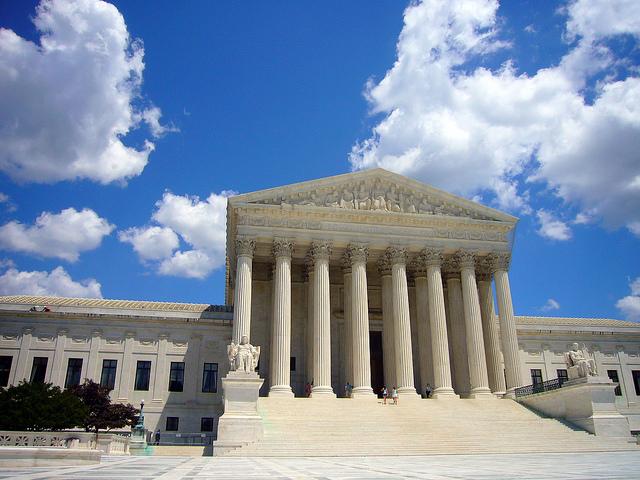‘In 30 years of practice I don’t think I’ve seen a legal brief that was more intended to smear the other side with false accusations and innuendo, and less intended to focus on the real merits of the case.’
While that quote might resemble the fallout of an acrimonious divorce, it was in fact from Bruce Sewell, Apple’s lead attorney, in response to federal prosecutors’ formal position in the ongoing San Bernardino encryption case.
It serves to illustrate just how hostile the war of words between Apple executives and American officials (and supporters of those camps) has become over the last month.
The past two weeks has seen the big guns enter the fray once more.
At a tech conference in Texas, President Barack Obama gave fairly balanced commentary on the situation, while ultimately coming down on the side of law enforcement. He cautioned that it would be unwise to take an ‘absolutist’ view on the topic, and went on to state:
‘So if your argument is strong encryption no matter what, and we can and should create black boxes, that I think does not strike the kind of balance that we have lived with for two hundred, three hundred years and it’s fetishizing our phones above every other value. And that can’t be the right answer.’
The ‘absolutist’ view is certainly one that Apple CEO Tim Cook has taken. Taking advantage of the always-hyped launch of new Apple products, Cook began his presentation with a call for debate:
‘We need to decide as a nation how much power the government should have over our data and over our privacy… We did not expect to be in this position, at odds with our own government. But we believe strongly that we have a responsibility to help you protect your data and protect your privacy. We owe it to our customers and we owe it to our country… This is an issue that impacts all of us and we will not shrink from this responsibility.’
While there are clearly some altruistic intentions behind Apple’s challenge, Cook failed to mention that Apple has a share price to protect, and—as I explained in my previous piece on this matter—encryption has become a selling point for tech customers.
The iPhone has become far and away the best-selling product in Apple’s line-up, accounting for 62.54% of the company’s total revenue in the final quarter of 2015. In the context of a saturated US smart phone market and a Chinese economic slowdown, there are expectations that iPhone sales will contract this year. Apple faces a sizable pressure to protect its historically incredible market performance.
Unfortunately, its share price at the beginning of February 2016 was at its lowest in two years. However, it appears that the company’s position on encryption isn’t doing their business any harm. All publicity is good publicity after all, and Apple’s share price has risen some US$10 since February this year.
A number of ex-senior US officials, including the former Director of the Department of Homeland Security, Michael Chertoff, and former White House cyber czar, Richard Clarke, have been speaking out against the US government on the encryption issue. Chertoff recently argued that developing software to weaken the iPhone’s existing protections would be akin to ‘creating a biological weapon’ and would be entirely counter-productive to broader national security, potentially enabling a wider cross-section of criminals and governments with access. Clarke took this one step further, stating that ‘encryption and privacy are larger issues than fighting terrorism.’
There’s also a clear difference of opinion within the US government on this issue. While the FBI and Department of Justice have dug their heels in, the Departments of Commerce and State and the White House’s Office of Science and Technology Policy have all argued that encryption is integral to protecting Amercian secrets, technologies and industries.
Most significantly, US Defense Secretary Ash Carter told the RSA conference in March:
‘Just to cut to the chase, I’m not a believer in back doors or a single technical approach… I don’t think it’s realistic. I don’t think that’s technically accurate.’
Clearly the Defense Department is concerned about sustaining it’s hard-won relationships with Silicon Valley. The rapturous applause that greeted Carter’s intervention will have put his mind at ease for now.
The biggest twist in the case occurred this week on the day before the court hearing was scheduled to take place. The FBI asked the court to postpone the hearing claiming that an ‘outside party’ had demonstrated a feasible way to crack the iPhone in question. It’s a fascinating development and there should naturally be questions about why the offer came at this late stage.
Richard Clarke claimed that the FBI wasn’t seeking help from the likes of the NSA as ‘they just want the precedent [of court-ordered access]’ to be established by the case.
There is no clear consensus on the encryption issue, and it can be expected to continue to split opinion and drive high emotion on all sides of the debate.
Regardless of whether the court case takes place or not, the fall-out from recent events will take its toll. The last of these three pieces will look at some of the potential consequences of the encryption debate we’re currently having.
